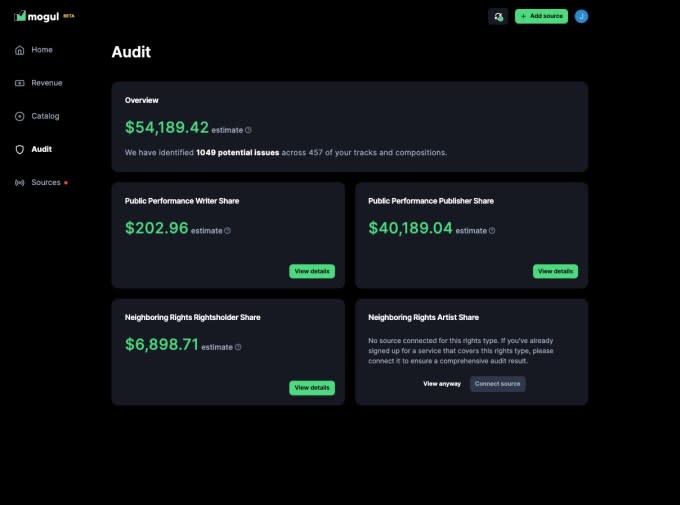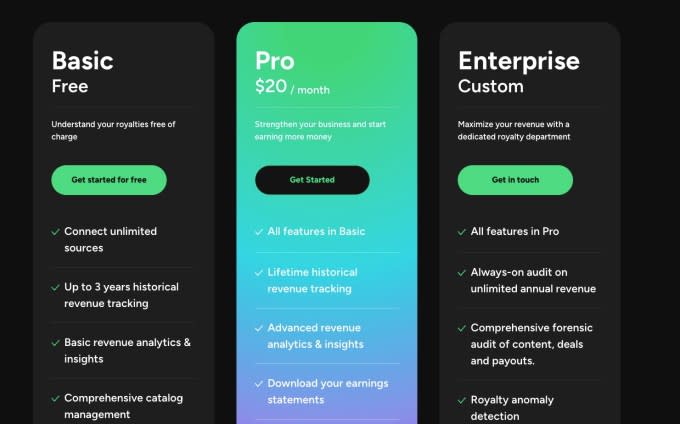Mogul wants to help musicians track unclaimed royalties
The complex world of royalties and rights management is a huge pain point for artists. With the rise in the number of record labels and streaming platforms around, it could be tricky for artists to track where their work is being used and how they are earning from different platforms. Mogul wants to make it easy for artists to track their income and even know about missed revenue opportunities.
The company
The company has raised $1.9 million in seed funding from Wonder Ventures, United Talent Agency, Amplify.LA and ex-SoundCloud CEO Kerry Trainor’s Creator Partners. Mogul was co-founded in 2023 by former SoundCloud head of creators Jeff Ponchick and former SoundCloud VP of engineering Joey Mason.
Ponchick told TechCrunch over email that after the duo left the company in 2022, they started thinking about the idea of tracking missed royalty income for musicians.
"We were very interested in why musicians always needed more money but were having issues taking steps to get paid what was owed to them. This felt counterintuitive. We dug deep and got on calls with musicians with different career trajectories and a lot of similarities started to emerge in the problems they were facing," he said.

Image Credits: Mogul
The company has been in private beta with 250 artists, where it tracked $3.5 million in previously unidentified revenue.
What does it do?
Mogul provides an overview of an artist's income sources — both publishing and sound recordings — such as mechanical royalties (streaming and reproduction of music), public performance rights and neighboring rights (use of a track in places like broadcasting).

Image Credits: Mogul
The company lets artists connect to different sources for music distribution such as Audiomack, District, FUGA and DistroKid. Once they connect different sources, they can track royalties coming from different platforms.
Artists can look at their income from different streaming platforms along with track-specific income. All the companies that work with artists have to provide raw data about their royalties. Ponchick noted that these files are often unused unless an artist chooses to perform an audit. Mogul is trying to get data from these files and tracks — by performing an automated "desk audit" — if an artist has any missing income from the rights they hold.
The company estimates that artists miss out on royalty incomes that are almost 10% of their lifetime earnings. The founder emphasized that missed royalties are often a result of issues created while registering for copyrights.
"Frankly a lot of it boils down to registration-based issues. With so many platforms an artist has to manage and take care of, a lot slips through the cracks just due to the sheer complexity and opaqueness of the music industry. Our job is to clean this up," he noted.
Marcus Cobb, co-founder of creator payment splitting solution Mozaic, said that music is intellectual property by law, which involves a lot of complexity about how artists can make money.
"The music you hear in the background of a restaurant has different rules and regulations than the music you stream from Spotify or even the music you hear on TV, movies and video games. These rules are very strict. They require detailed registrations on who your collaborators are and how everyone's sharing ownership of the copyrights," he said.
Cobb noted that even small mistakes in registration of copyrights can result in unpaid royalties for years.
Making money
Mogul is exploring different ways to start earning revenue. For starters, it is introducing a SaaS model that gives different levels of auditing to startups along with features like royalty anomaly detection for enterprise customers.

Image Credits: Mogul
The company has also piloted a model where it takes a percentage cut from artists from the royalty recovery amount. It said that it would finalize a model based on artist feedback.
The question of royalties
With the onset of short video platforms, there are now more places where artists' work is being used. There is also a growing conversation about artists earning a fair share of royalty and regulators are also looking at the issue sternly.
In the U.S., lawmakers like Rashida Tlaib are trying to find legislative ways to get musicians to be paid more. Last year, France proposed a tax on music streaming services to fund a body supporting musicians. Earlier this year, the EU said that the bloc is exploring new rules for a better distribution of streaming revenue amongst artists.
With this complex and evolving system, investors in Mogul feel there is an opportunity for the startup to help artists.
"The way revenue is tracked and remitted is complex and constantly evolving. This pain is felt across all creators, it doesn’t matter if you’re a musician, a digital creator, or a podcaster," Caroline Jacobs, a partner at UTA.VC, said.
"Artists must log into multiple platforms that may not integrate with each other to track revenue performance -- and sometimes there’s 'lost' revenue where an artist may not be getting royalties due to misspellings, incorrect account information, among many other reasons."
Sam Wick, the head of UTA.VC said that the challenge for Mogul will be making the platform easy to understand for musicians.
"Making the platform and reporting easy to use and understand will be key to success. Mogul will interface with multiple platforms, rights information and territories. It is an incredibly complex problem," he said.
Mozaic's Cobb, who sees promise in tools like Mogul, said that often musicians are short on cash when they start out. And a plethora of tools and services promise to help them collect money with fees as high as 20%, so they have to build trust with artists.


